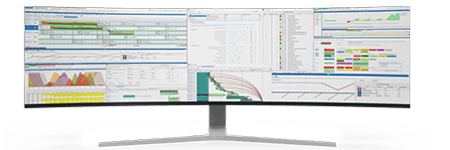Implementing Smart Technology in Pharmaceutical Manufacturing
The pharmaceutical manufacturing industry is navigating an era defined by rapid advancements in smart technology. As a Manufacturing IT Manager, you play a central role in leading your facility’s journey toward digital transformation, where intelligent technology isn’t just a convenience—it’s a necessity for competitive advantage. Implementing smart technology in a pharmaceutical environment brings unique challenges, but the right integration of advanced tools such as PlanetTogether with established ERPs like SAP, Oracle, Microsoft, Kinaxis, or Aveva can streamline this process, enhancing production efficiency, compliance, and quality control. This article explores how to approach smart technology implementation, emphasizing the pivotal role of IT in integrating advanced planning systems with ERP solutions.

Smart Technology in Pharmaceutical Manufacturing
Pharmaceutical manufacturing is a highly regulated and intricate field, where each stage of production demands precision, accuracy, and strict compliance. Smart technology, encompassing IoT, AI, machine learning, and advanced data analytics, provides a solution to many of these challenges. It transforms traditional manufacturing processes into dynamic, data-driven operations that can respond to real-time conditions, predict potential issues, and optimize resource allocation.
Integrating smart technology with robust planning and scheduling software like PlanetTogether brings pharmaceutical manufacturers closer to achieving the “smart factory” ideal. However, smart technology cannot reach its full potential without effective integration with ERP systems. By connecting PlanetTogether with an ERP like SAP, Oracle, Microsoft, Kinaxis, or Aveva, manufacturers can harness real-time data, streamline workflows, and make informed decisions quickly.
![]()

Key Benefits of Implementing Smart Technology with PlanetTogether-ERP Integration
1. Real-Time Production Visibility
Integration between PlanetTogether and ERP systems enables manufacturing teams to obtain a holistic view of production operations. This real-time visibility is crucial in the pharmaceutical industry, where deviations in quality, compliance, or schedule can have serious ramifications. With data from both planning systems and ERPs available in a single interface, IT managers can help provide stakeholders with insights into inventory levels, production schedules, quality control, and workforce allocation.
For instance, if a bottleneck occurs, integrated systems allow for quick reallocation of resources without disrupting the entire production flow. Real-time visibility also improves the ability to forecast and anticipate production needs based on current demand trends, ultimately helping prevent costly downtimes and reduce inventory overhead.
2. Enhanced Compliance and Traceability
Pharmaceutical manufacturers must adhere to stringent regulatory standards. Smart technology, combined with PlanetTogether and ERP integration, enhances compliance efforts by ensuring every production detail is captured, stored, and traceable. Through the integration, all data collected by PlanetTogether’s scheduling and resource allocation capabilities seamlessly flow into the ERP, creating a transparent and traceable production history.
This streamlined traceability supports compliance audits by enabling immediate access to the entire lifecycle of a product batch. When an anomaly occurs, such as an out-of-spec material usage or deviation in production parameters, these integrated systems can quickly identify, track, and document the issue, thereby safeguarding product quality and regulatory compliance.
3. Data-Driven Decision-Making
When ERP systems are integrated with advanced planning and scheduling tools like PlanetTogether, IT managers can equip operational teams with deeper data insights. These insights enable predictive analytics that can help production planners and quality control teams make proactive decisions. For instance, an integration with an ERP like SAP or Oracle allows for data on raw materials, production rates, and equipment availability to feed directly into PlanetTogether’s scheduling algorithms. This enables real-time, data-informed scheduling adjustments based on existing resources, demand fluctuations, and machine performance.
The ability to make data-driven decisions enhances efficiency, as managers can adjust production schedules in response to incoming orders, optimize labor allocation based on demand, and prevent overuse of costly resources. In a field where timing and precision are critical, this capability can transform production planning from a reactive process to a predictive, optimized workflow.
4. Optimized Asset Utilization and Predictive Maintenance
Integrating PlanetTogether with ERP solutions also helps optimize asset utilization. Pharmaceutical manufacturing assets, from mixers and fermenters to filling lines, are capital-intensive and must operate at maximum efficiency to justify their costs. Smart technology in combination with PlanetTogether’s scheduling algorithms can identify trends that signify when a machine may require maintenance before it breaks down, leading to proactive, predictive maintenance.
By interfacing PlanetTogether with ERP platforms like Aveva, for example, manufacturers can set predictive maintenance schedules that reduce downtime and avoid the costly consequences of unexpected equipment failure. This proactive approach not only extends the life of assets but also enhances overall productivity.

Best Practices for Integrating Smart Technology in Pharmaceutical Manufacturing
For a successful implementation of smart technology through PlanetTogether and ERP integration, several best practices are essential:
1. Assess Your Current Technological Landscape
Before implementing new technologies, it’s important to assess the current state of your technology landscape. Inventory your current ERP capabilities and identify gaps in integration that might hinder real-time communication with PlanetTogether. Working closely with production managers and quality control teams, determine which processes could benefit most from automation and smart technology.
2. Establish Clear Goals for Integration
Integration without clear goals can result in costly implementations with limited ROI. Define your goals, whether they’re improving compliance, enhancing real-time data access, or boosting scheduling accuracy. With these goals in mind, determine what information needs to flow between PlanetTogether and the ERP system and how data will be accessed, stored, and used. For example, if predictive maintenance is a priority, focus on integrating asset health data from the ERP into PlanetTogether.
3. Prioritize Data Security and Compliance
In an industry as sensitive as pharmaceuticals, data security and compliance are paramount. Ensure that the integration framework complies with industry standards, such as FDA’s 21 CFR Part 11, which mandates the secure handling of electronic records. Your IT team should work closely with PlanetTogether and ERP providers to ensure data encryption, secure access protocols, and robust logging and auditing capabilities are in place. This approach helps maintain regulatory compliance and safeguard sensitive information.
4. Foster Cross-Department Collaboration
Smart technology adoption cannot succeed without collaboration among various departments. As the IT manager, facilitate collaboration between production planning, quality control, and supply chain teams to ensure a unified approach. Each department has unique requirements that the integration must address. For instance, quality control will prioritize data accuracy for compliance, while production planners may need flexibility in scheduling adjustments. Bringing these perspectives together will lead to an integration plan that aligns with overall business objectives.
5. Ensure Scalable Integration for Future Growth
Smart technology adoption is a continuous journey. Ensure that your integration framework between PlanetTogether and ERP systems is flexible enough to scale as your company grows. For example, if you expand your production capabilities, your scheduling and planning needs may change. Working with ERP and scheduling providers to set up scalable APIs or data pipelines can help you avoid reconfiguring integrations as your company’s needs evolve.
As a Manufacturing IT Manager in a pharmaceutical facility, you’re at the forefront of implementing transformative smart technologies. Integrating PlanetTogether with ERP systems like SAP, Oracle, Microsoft, Kinaxis, or Aveva is crucial to realizing the full potential of these technologies in a compliant, efficient, and responsive manufacturing environment.
Smart technology empowers pharmaceutical manufacturers to improve production visibility, ensure compliance, and optimize resource utilization. The strategic integration of PlanetTogether with ERP systems is a powerful way to bring these benefits to life, creating a streamlined, data-driven production operation that meets both current and future demands. With clear goals, robust security, and collaborative planning, you can successfully implement a smart technology framework that transforms your facility into a model of efficiency and innovation.
Are you ready to take your manufacturing operations to the next level? Contact us today to learn more about how PlanetTogether can help you achieve your goals and drive success in your industry.
Topics: PlanetTogether Software, Integrating PlanetTogether, Data-Driven Decision-Making, Enhanced Compliance and Traceability, Real-Time Production Visibility, Optimized Asset Utilization, Minimized Waste, Pharmaceutical Manufacturing, Improves Productivity, Optimized Predictive Maintenance





















LEAVE A COMMENT